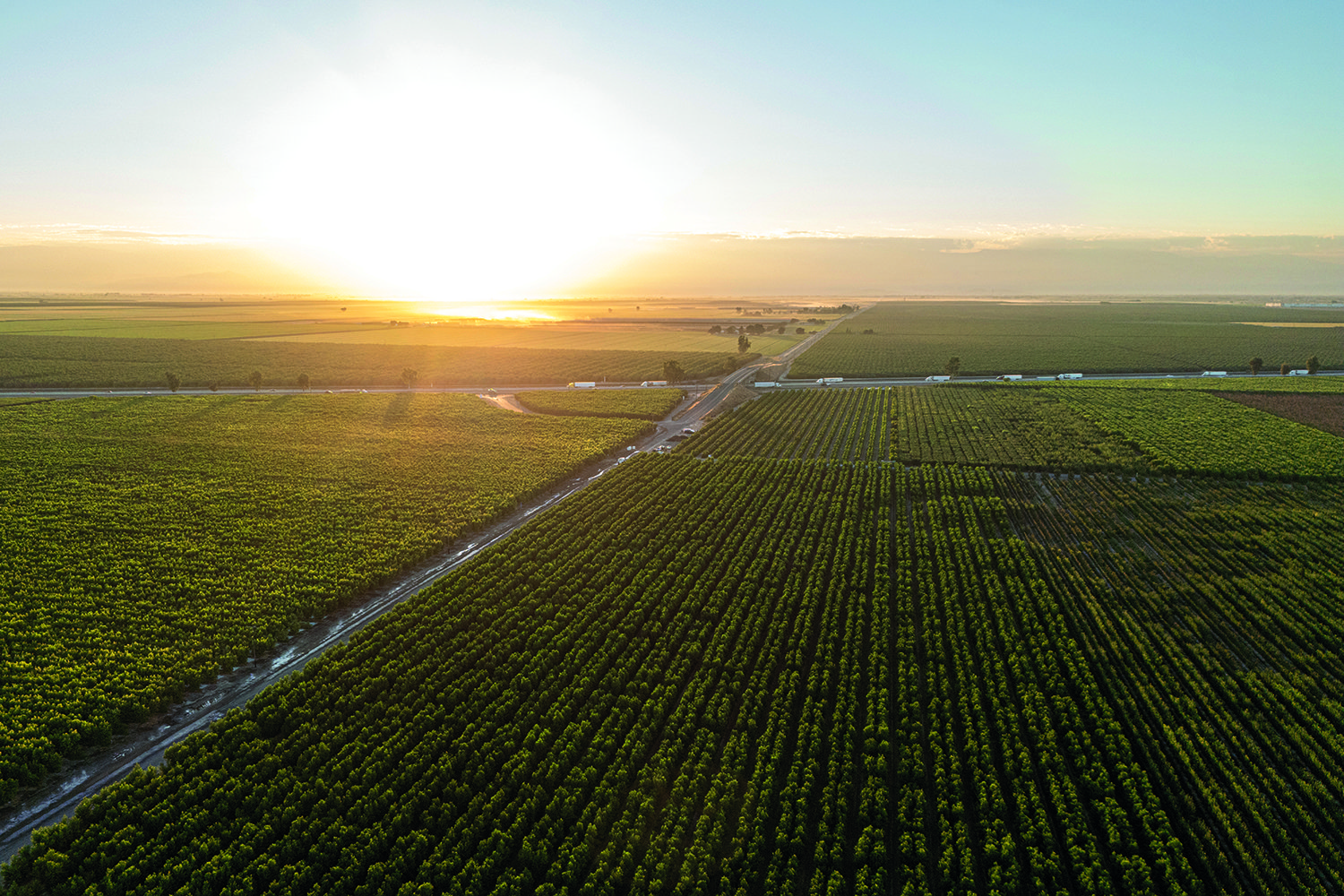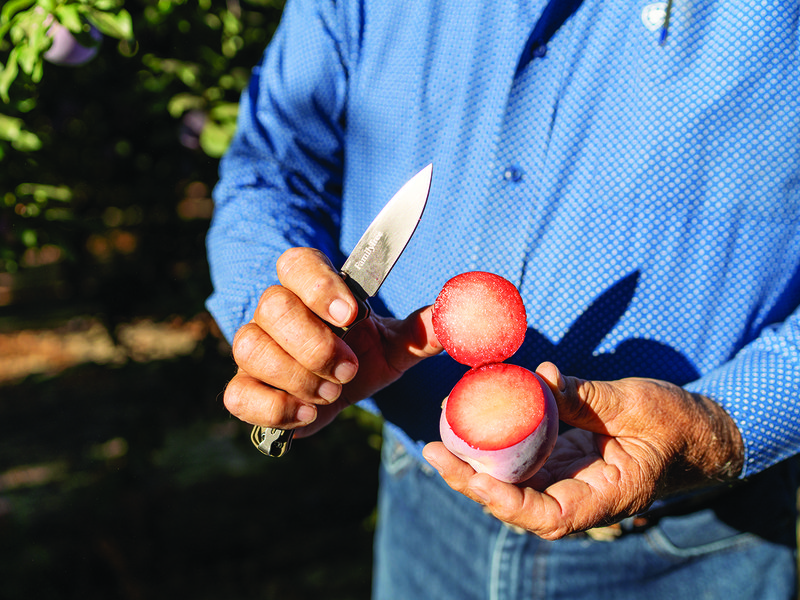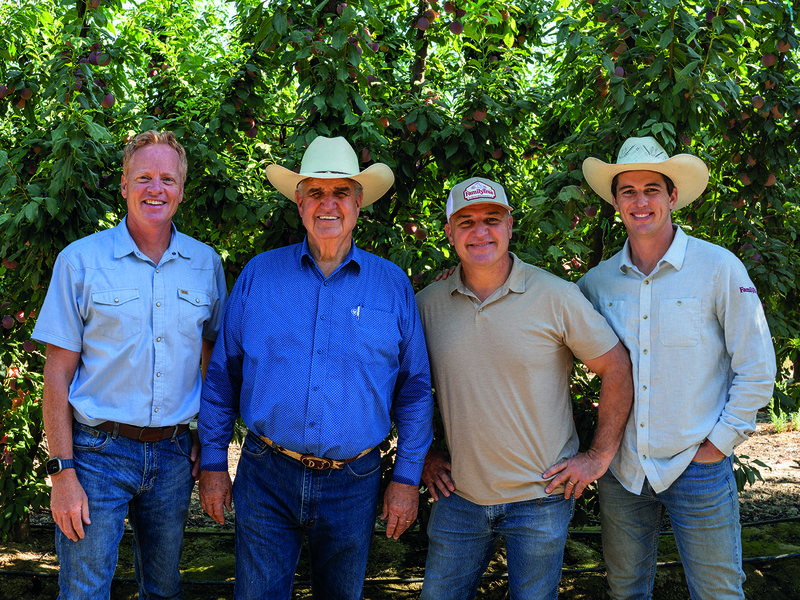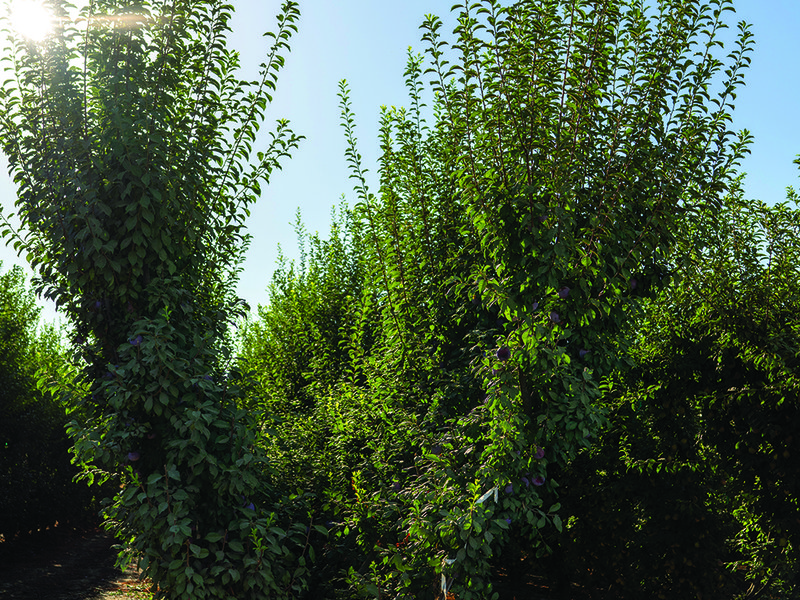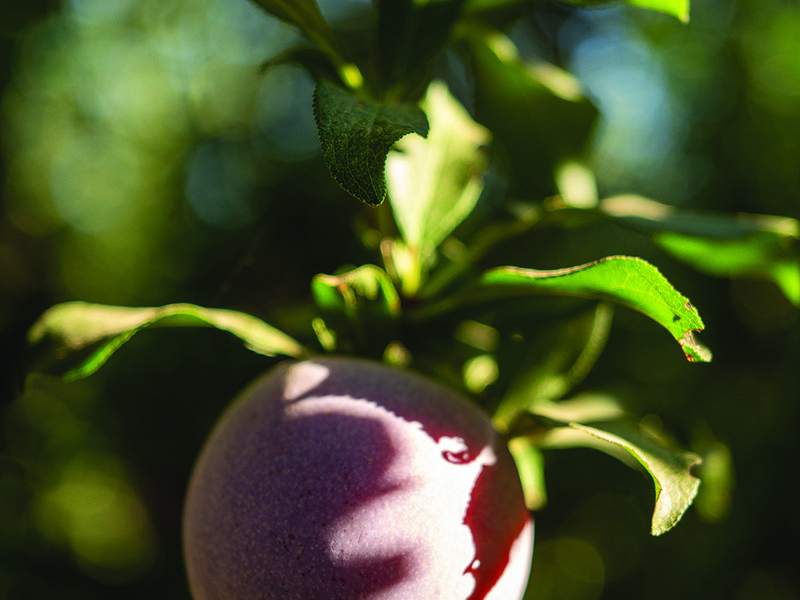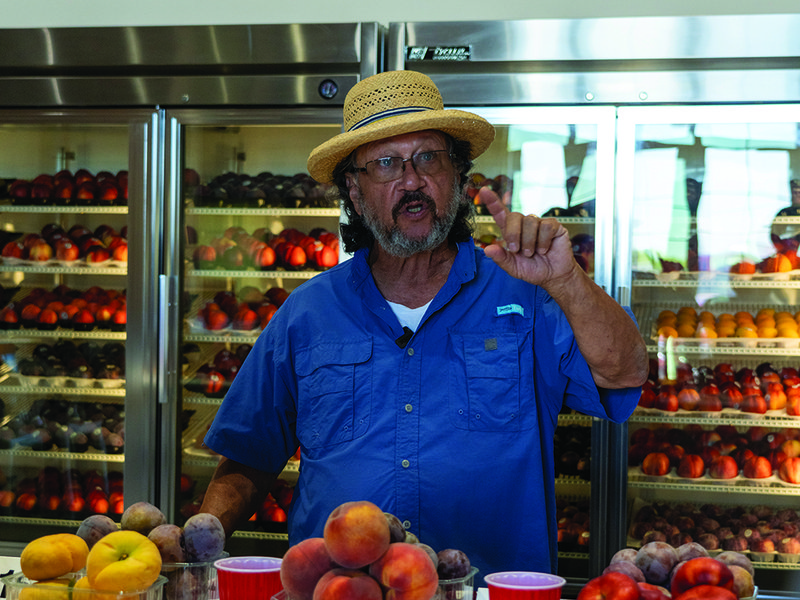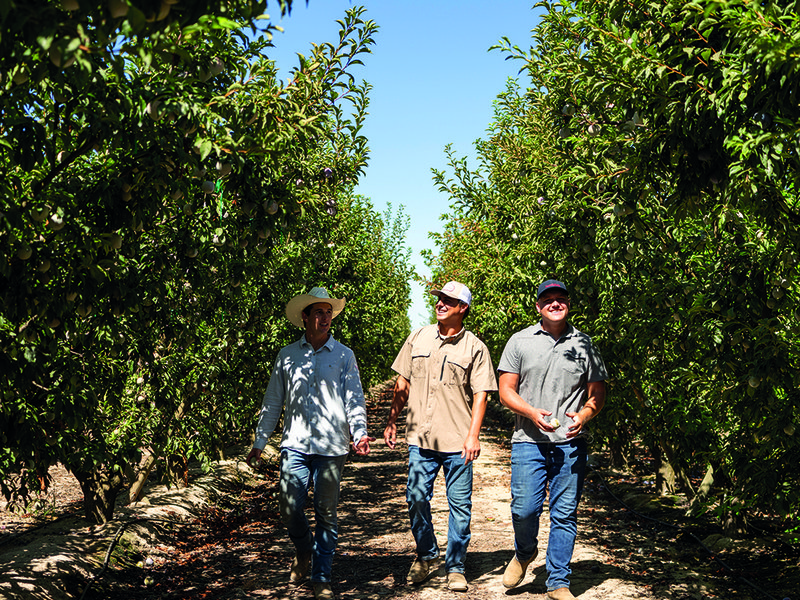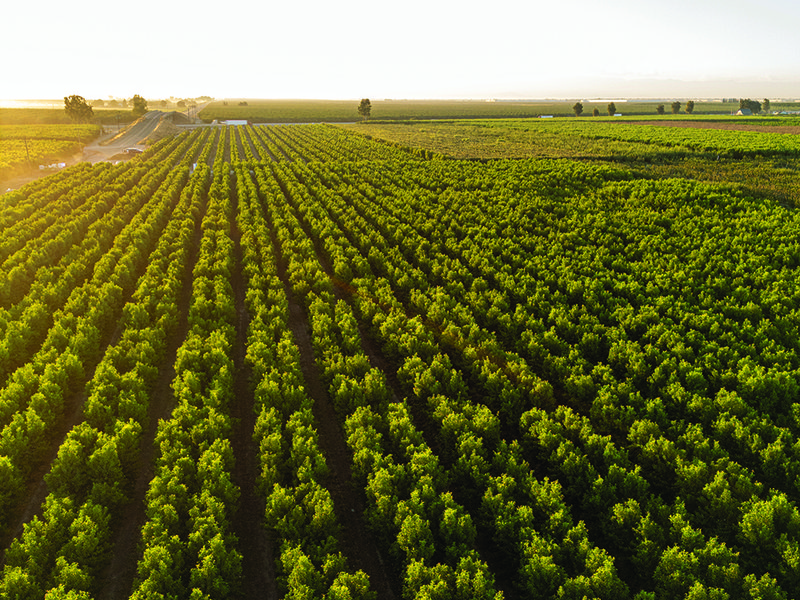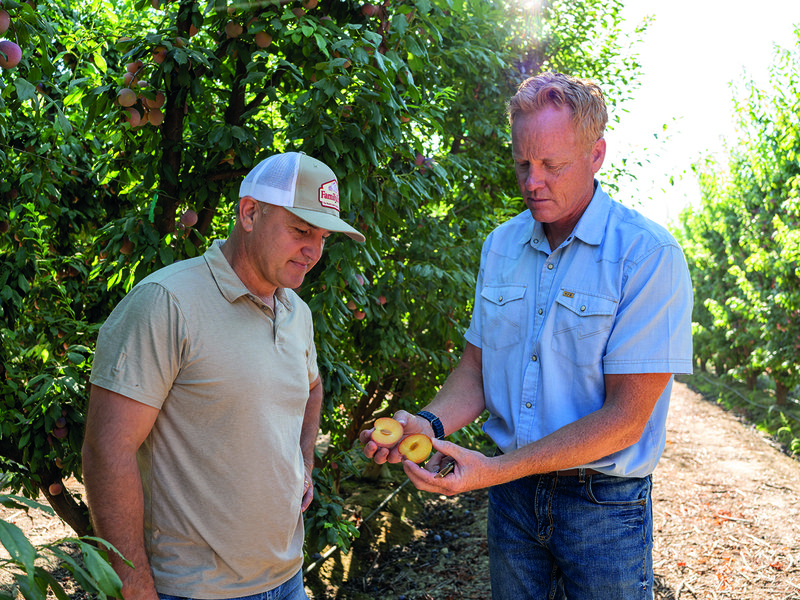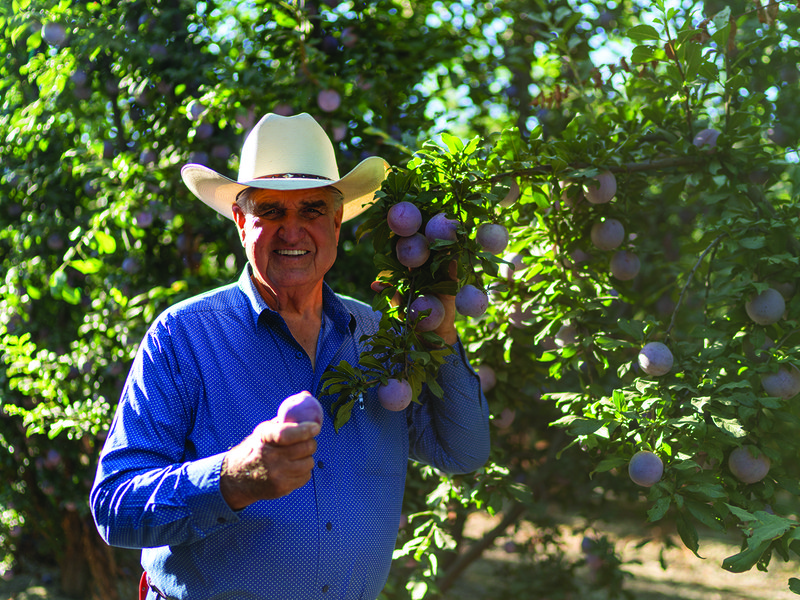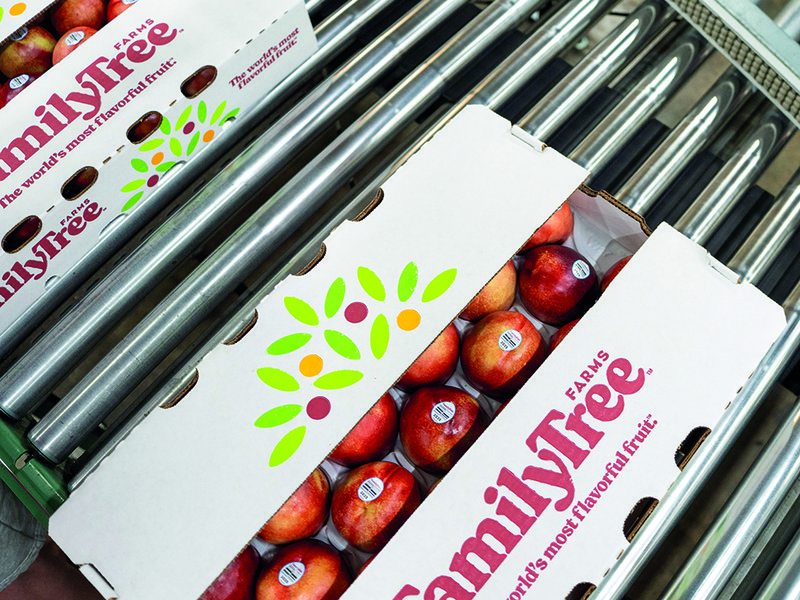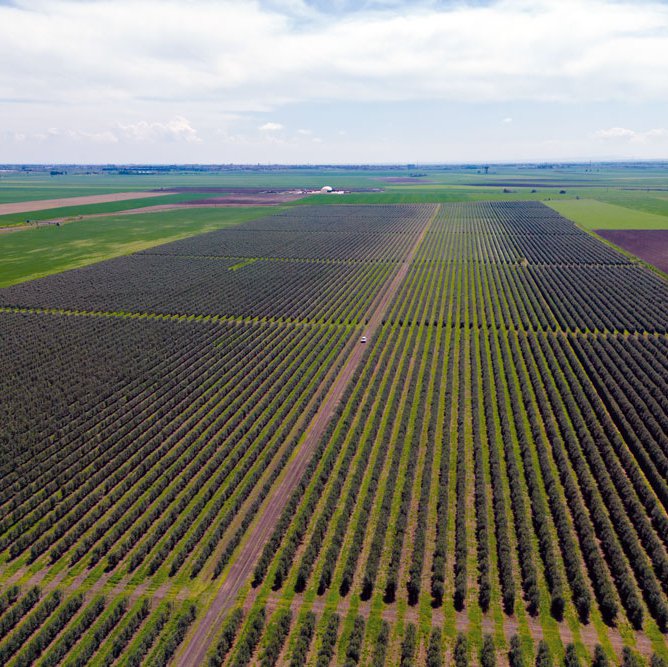Family Tree Farms dates back to the year 2000, but its roots run much deeper and older. Founder and owner David Jackson comes from a long line of farmers; his father moved to central California as a labourer in 1936, and later bought his own 40-acre farm. “I followed behind him in the fields as a child and worked beside him as a teenager,” says David today.
“He was never a large-scale farmer, but he was a hard worker, an honest man and a great inspiration to me.” His father once advised him never to come home early, but instead to take a chair and sit out in his orchard.
“He said to look at the trees and just listen. To ask them: ‘Are you hungry?’ ‘Are you thirsty?’ ‘Is there anything biting you?’ ‘Do you need more sunlight?’ … He told me that when you ask those questions you become a farmer who puts his shadow on the soil and nothing grows well unless you do that.”
In the decades since, and especially since founding Family Tree Farms, David has grown “a large number” of the 340 different crops that make up the vast agricultural lands of the Central Valley. “We first specialised in stone fruit – peaches, plums, nectarines, apricots. Later we found some fabulous blueberries to work with and I always said I didn’t want to be as good as others in the marketplace; I wanted to be the best in the world, like an Olympic champion.
“We made it our mission statement to consistently produce and package the most flavourful fruit in the world. When the consumer eats a piece of our fruit, I love to hear them say ‘Wow’. That’s the gold medal reward that Family Tree Farms is looking for.”
As he relates all this, David is sitting in one of his many orchards, this one set aside for plum-apricot hybrids known as plumcots. They are indeed growing well on a network of v-shaped, evenly spaced Tutura trellises, named after the agricultural region of Australia where he went to survey the local farming techniques some 45 years ago.
“You can see how they let sunlight come in from all sides, which is what you need to make the fruit sweet and colourful.”
The last quarter century has seen Family Tree Farms branch out in various ways at once, the ever-expanding workload shared by younger generations of Jacksons, and the family now extending to 86 members, including 21 grandchildren and 38 great-grandchildren. “All the men of working age are part of Family Tree Farms,” says David.
The makeup of the business is such that each constituent farm operates independently. Many in the family run their own orchards, with their own managers and irrigation teams, but all the resulting produce is gathered and packaged “under the shade of Family Tree Farms.” David’s son Daniel and son-in-law Andy Muxlow are both company co-owners. They’ve been friends since childhood – Andy grew up to marry Daniel’s sister Becky – and farmers almost as long.
And while both still keep their “boots on the ground” in that essential capacity, says Daniel, “from there we spread into other areas where we might have other gifts.” His own specialisms tend toward business development and international operations. When it comes to export, supplying valued clients such as Spinneys makes him marvel at what’s now possible. “To get a piece of fruit from Central California all the way to Dubai … what a special world we live in. The tech and planes and ships that get this fruit all around the world, it just fires us up.” At the same time, says Daniel, “we learned years ago that agriculture doesn’t just happen in the middle of California,” he says. “It’s a big world out there. So, we started travelling all over, meeting breeders of different commodities.”
An international cohort of some 31 plant breeders now share their genetic materials with Family Tree Farms, from blueberries in Mexico and Peru, to table grapes and yellow and red kiwi fruit in the Cape region of South Africa, with genetic profiles exclusive to the company.
“These breeders basically give us their life’s work,” says Andy, who handles the marketing side of the operation, “and we act as stewards to help them plant their genetics around the world. The core of our business is the farm, but the foundation of the farm is genetics. You can be best the farmer on the planet, but you need the best varieties to succeed.”
Most of that new fruit is sampled here at Family Tree Farms’ renowned research and development centre and tested for commercial viability in what Daniel calls “our special soil and climate.” That core component of the business is overseen by Eric Wuhl, a man who lives to “talk fruit”, as he puts it.
At a tasting session held during the Spinneys team’s visit, he picks up a specimen from a new variety of nectarine they have named Necta Pink.
“At first look, it’s not very attractive,” says Eric. “It’s got a lot of freckles, or sugar spots. However, we find it to be unique because of its wonderful flavour, sweet with a slight touch of acid, like a super-ripe mango. A lot of times our flavour panels want to refer to this as ‘mangolicious’.” The modern grocery shopper, he goes on, has been conditioned to think of apparent blemishes on a piece of fruit as reasons not to buy it. Eric and his team have been trying to “change our customers’ minds” on that point, and “to show our retailers, too.”
“I am, unfortunately, 69 years old, and I’ve been standing over fruit for most of my life,” he says. “One thing I’ve learned is to work out which are the sweet nectarines. And if I want a piece of fruit to bring my mom, or my friends, I look for these sugar spots. The industry likes shiny fruit, which appears more attractive, but is never as sweet as the one with the spots.”
Outside in the fields, the younger generation say they have learned almost all there is to know about this business from Eric and, of course, from patriarch David Jackson. “I never went to college to study agriculture or anything like that,” says David’s grandson Troy, who manages his own team for picking, thinning and pruning the crops.
“I just worked on the farm since I was a little kid of about five years old and started full-time here right after high school. But I always say I have the best professors in the world. My grandpa knows more about farming than anyone I can think of and Eric has been all over America, worked on every commodity …”
Ty Muxlow, Andy’s son, does a similar job in the orchards on a daily basis. He has a little more academic experience and can vouch for the superior hands-on education they received as boys on the farm. “What I love is getting to learn from each other,” says Ty, who describes his lifelong working relationship with his cousins as “kind of a brotherhood.”
From their elders, they have picked up ideas and practices that “might be industry standard and might not be in some cases”. “There are so many different nuances to the varieties we grow and we’re always trying to be innovative, always experimenting with thinning and pruning.” They’re always joking, too, Ty says, which tends to leaven all that hard labour.
Grant Garcia, who married into the family and now manages “the trucking and equipment side of things”, has had less time to absorb that great wealth of farming knowledge. Over a decade in this company, he has come to savour the feeling that he’s able to “grow a future”.
“But the great blessing”, says Grant, “is being part of this quest to find the most flavourful fruit in the world.” Asked for their favourite fruits among the surrounding crops, Grant picks a plum known as the Plum Cherry. “It’s small, but the flavour is fantastic.” Troy, for his part, picks the hybrid plumcot growing right behind him as he speaks – the variety they call Flavor Gator. “It’s got green skin but you bite into incredible dark red flesh, sweet as candy.”
Growing up, he says, he was always taught to wait a little longer than the average farmer for that sweetness to arrive. “The guy across the street” might get his crop out earlier, but Family Tree Farms holds out for full ripeness, “to ensure that each piece of fruit is the best you’ve had in your life.” Troy will often go around the valley giving out the family’s produce for strangers to try, and word most often heard is the one this whole dynasty lives to hear: “Wow.”
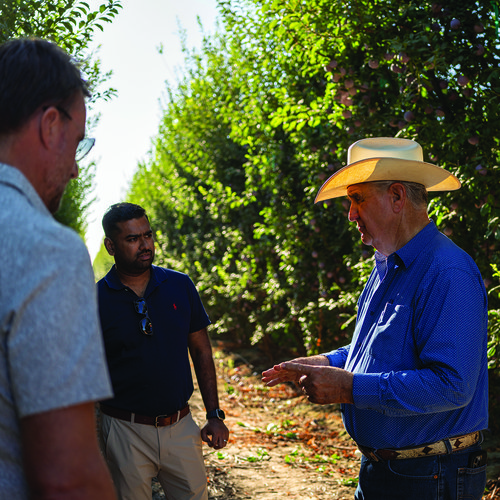
Produce commercial manager
Neil Gibson says
We certainly felt the wow factor when visiting Family Tree Farms recently. This is a true family business working together to preserve the fruits of the land for many generations ahead. Family Tree Farms is the gold standard among stone fruit growers and we are incredibly excited to bring new special varieties and flavours to our customers this autumn. Look out for cherry plums, black apricots, emerald beauty plums and yellow peaches with the Family Tree Farms logo in Spinneys stores this September.
